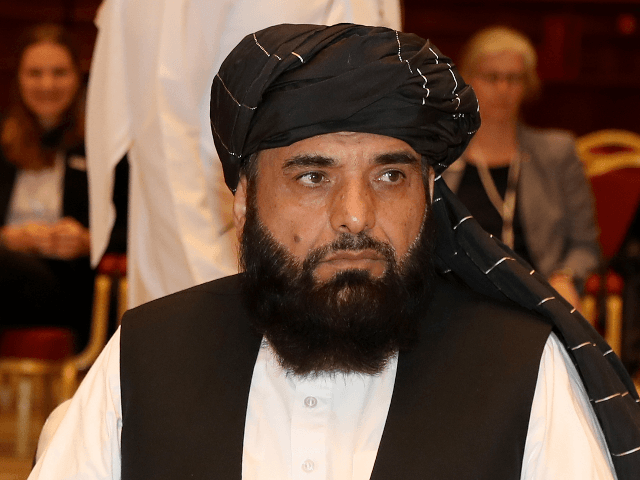Afghanistan’s Taliban “won’t easily fall into the trap” allegedly laid by U.S. media to coerce the Sunni Islam-based terror group into publicly denouncing China’s genocide against Muslim ethnic minorities in China’s westernmost region of Xinjiang, China’s state-run Global Times argued Monday.
“Obviously, the Western media was attempting to stir up troubles between the Taliban and Beijing, but the Taliban won’t easily fall into the trap,” Qian Feng, a research director at the National Strategy Institute at Tsinghua University in Beijing, told the Global Times in an op-ed published July 12.
Qian referred to a July 8 article by the Wall Street Journal in which the U.S.-based newspaper asked a Taliban spokesman named Suhail Shaheen, “whether a Taliban-dominated government of Afghanistan would join Western nations in condemning human-rights abuses in Xinjiang at the United Nations.”
Shaheen refused the opportunity to denounce the Chinese government’s mistreatment of mainly Sunni Muslim ethnic minorities in Xinjiang, which includes the extralegal detention of an estimated 1-3 million Uyghurs, Kazakhs, and Kyrgyz people in state-run camps since about 2017.
“Any such decision would have to be made based on the ground realities at that time,” he responded.
“We care about the oppression of Muslims, be it in Palestine, in Myanmar, or in China, and we care about the oppression of non-Muslims anywhere in the world. But what we are not going to do is interfere in China’s internal affairs,” a senior Taliban official in Doha, Qatar, told the Journal when asked to condemn the Chinese Communist Party (CCP)’s actions against Uyghurs in Xinjiang for the same article.
“Questioning the Taliban on the Xinjiang issue, the West did not really care about Xinjiang Uygurs’ human rights,” the Global Times claimed Monday. “It instead hoped to sow discord between Beijing and the Taliban. The so-called Xinjiang human rights issue is only a tool created by the US and its Western allies to smear and create trouble for China.”
“‘American politicians hate Chinese and Muslims, but somehow, they care about Chinese Muslims’ — this joke now has become known to all,” the CCP mouthpiece alleged.
“Obviously, Washington wants to drag China’s Xinjiang into a quagmire like the one that plagues Afghanistan to create trouble for China. Fortunately, this reality has been seen through by an increasing number of countries, especially Muslim countries,” the Global Times further argued in its July 12 op-ed.
China’s ruling Communist Party accuses Xinjiang’s Sunni Muslim minorities of perpetrating a series of terror attacks against the region’s ethnic Han Chinese majority in the years leading up to Beijing’s 2017 security crackdown on Uyghurs, Kazakhs, and Kyrgyz people in the territory. Xinjiang borders Afghanistan to the east and militant members of its Sunni Uyghur population have long been tied to Afghanistan’s Taliban, a jihadist terror group likewise centered on Sunni Islam.
China claims the group behind most of these attacks is the East Turkestan Islamic Movement (ETIM), a group removed from the U.S. list of Foreign Terrorist Organizations last year on the grounds that no evidence suggests that it exists.
The Taliban claims it has recaptured roughly 85 percent of Afghanistan’s territory in recent weeks in the wake of an ongoing Western troop withdrawal from the country by U.S. and North Atlantic Treaty Organization (N.A.T.O.)-allied forces. America led the War in Afghanistan (2001-present) in response to a terror attack on U.S. soil on September 11, 2001, which Washington blamed on Osama bin Laden and his Sunni Islam-based terror group al-Qaeda. America accused the Taliban of supporting its jihadist ally bin Laden as he allegedly hid in Afghanistan following the September 2001 terror attack. The U.S. military tracked bin Laden to Pakistan in 2011, neutralizing the Saudi-born terrorist in May of that year.
Washington plans to completely withdraw all U.S. military personnel from Afghanistan by August 31 as part of its stated goal of ending the war in Afghanistan, which launched in the autumn of 2001 with the U.S. ouster of the Taliban from Afghanistan’s government.

COMMENTS
Please let us know if you're having issues with commenting.